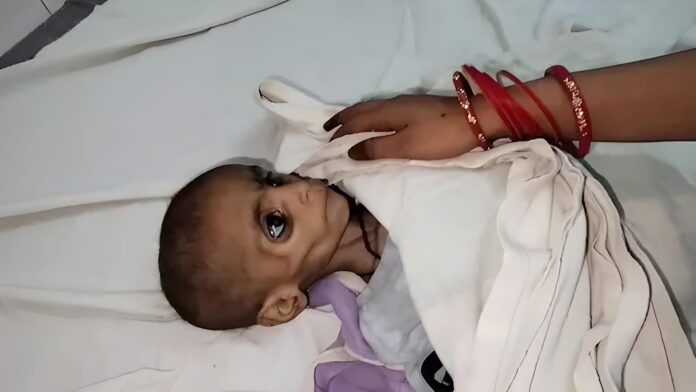A 15-month-old girl named Divyanshi from Shivpuri died of malnutrition at the district hospital. Weighing only 3.7 kg, far below the expected 8–12 kg for her age, her final days were marked not by disease but by silent neglect.
Authorities had flagged her under the Dastak Abhiyan healthcare initiative, yet her family never admitted her to the Nutrition Rehabilitation Centre, despite repeated medical advice. Her mother alleged a chilling truth: whenever the child fell ill, her in-laws refused treatment, saying, “Let her die, she is just a daughter.”
Divyanshi’s death is not an isolated tragedy. Just two days earlier, another girl, Radhika from Sheopur, died under similar circumstances, weighing a mere 2.5 kg. In Bhind district too, a toddler succumbed recently to severe malnutrition, exposing a disturbing pattern of neglect against girl children.
India continues to struggle with alarmingly high levels of child malnutrition. Nearly one in five children under five years suffers from wasting — a severe form of undernutrition. While poverty and lack of awareness play a role, deliberate neglect of girls is an added cruelty that worsens the crisis.
Experts point out that with prenatal gender screenings banned, families who remain biased against daughters sometimes turn to post-birth neglect. While most malnutrition deaths affect both genders unintentionally, cases of willful denial of food and medical care are overwhelmingly targeted at girls. This silent form of gender discrimination rarely gets recorded but leaves devastating consequences.
The government has invested in schemes like Poshan Abhiyaan, Dastak Abhiyan, and the establishment of Nutrition Rehabilitation Centres, but gaps in implementation and social attitudes continue to undermine progress. Community health workers repeatedly face resistance from families who refuse to cooperate, especially when the child in question is female.
Civil society activists argue that stronger legal measures, combined with community-level monitoring, are urgently needed. There are growing calls for strict accountability for families who deliberately deny treatment to children. Alongside, empowering mothers, increasing awareness about nutrition, and reducing the stigma around daughters is essential to break this cycle. Divyanshi’s short life, marked by hunger and neglect, is a stark reminder that India’s fight against malnutrition is not just about food or healthcare but about changing mindsets. Unless society and the state act decisively, more daughters may silently slip away, unheard and unseen.





